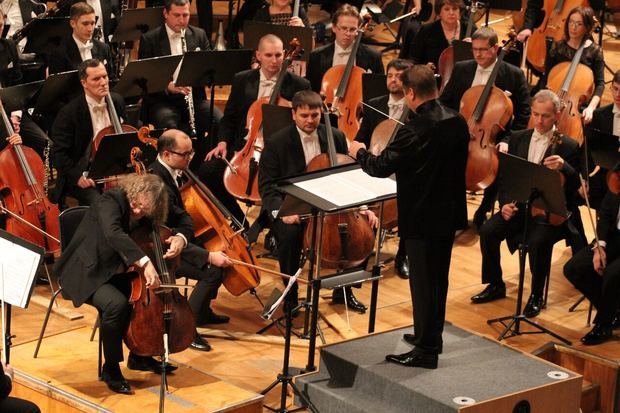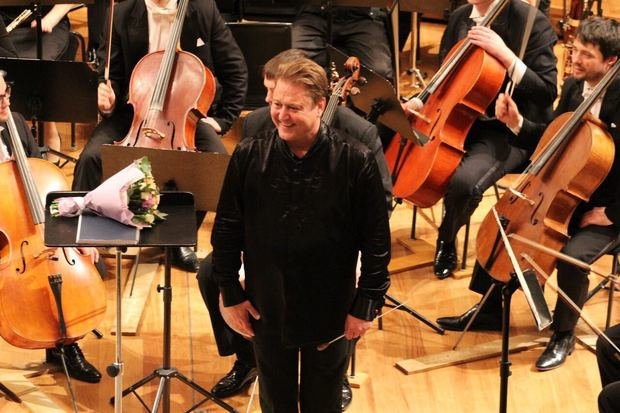Schnittke meets with Shostakovich
The festival of contemporary music Concordia finishes in Kazan
The final concert of Concordia, the International contemporary music festival named Sofia Gubaidulina, has taken place in the Saydashev State Great Concert Hall in Kazan. In the final concert of this year there have been works by Alfred Schnittke and Dmitri Shostakovich. Read the details in the material of Realnoe Vremya.
The second premiere
At the closing concert of the International festival of modern music named after Sofia Gubaidulina Concordia, the Tatarstan National Symphony Orchestra performed two titans of the last century — Dmitri Shostakovich and Alfred Schnittke, thus like showing the path that music developed in the country. Again, it is worth remembering Sofia Gubaidulina, after whom the festival is named. And Shostakovich, and Schnittke – it is her musical environment.
The first part of the concert was devoted to the music of Alfred Schnittke, it was performed his first concert for cello and orchestra. The soloist was Alexander Knyazev, who is known as one of the most charismatic cellists of his generation. Schnittke, who wrote this work in 1986, dedicated it to Natalia Gutman, the talent of whom he admired. Gutman became the first performer of this concert. The composer dedicated to her the sonata for cello and piano.

Knyazev confessed that Schnittke that he performed the concert only for the second time, that is, the performance of the Tatarstan National Symphony Orchestra and Alexander Sladkovsky can be counted as the second premiere of the cellist. Although the collaboration with Maestro Sladkovsky, who knows how to invite extraordinary soloists, and with the Tatarstan orchestra has already become traditional for the cellist.
Alexander Knyazev is a laureate of many prestigious competitions, he graduated from the Moscow Conservatory as a violinist and the Conservatory in Nizhny Novgorod as an organist. He performs with top orchestras and conductors. The arrival of the cellist at Concordia festival tells about the status of Tatarstan fest.
The concert for cello and orchestra by Alfred Schnittke in the interpretation of Alexander Sladkovsky and Alexander Knyazev — reflections of a man on almost tragic despair. Confusion, sadness, nostalgia on the verge of despair, the poignant cello in the first part and a lack of humility and hope in the final. This work by Alfred Schnittke is full of complex philosophy, it excites, it is the quintessence of irreconcilable with reality and aspiration there, in heaven spheres where there is no sorrow.
One of fifteen
The second part of the final festival concert was given to Shostakovich, there was his twelfth symphony The year 1917. It should be noted that Alexander Sladkovsky has a special attitude to the works of Dmitri Dmitriyevich. Perhaps, it is all about the St. Petersburg roots (Sladkovsky studied conducting at the Conservatory of St. Petersburg), perhaps, it is simply human and artistic 'chemistry', but the Tatarstan symphony orchestra performs Shostakovich quite often.

It has just recently finished the unprecedented work — on the initiative of chief conductor and artistic director the Tatarstan orchestra has recorded in Melodiya company all fifteen Shostakovich's symphonies and concerts. The CDs have been presented in Kazan this fall, in one of the most prestigious for musicians places — in the Grand Hall of Moscow State Conservatory. Considering that Dmitri Shostakovich took an active part in creation of the Symphony orchestra in Kazan, the circle closes. Shostakovich for Tatarstan sympthony orchestra is one of the main composers.
Symphony No. 12 of Shostakovich for Sladkovsky is the reason for reflection and not a tribute to the revolutionary past. Maestro is far not linear and does not follow the line of least resistance. He seems to analyse the story, sees the abyss into which the country fell after the October revolution.
Although we hear the echoes of the legendary Soviet Revolution Song Comrades, let's bravely march, although we know the name of the symphony, Shostakovich is not a kind of composer to write the conditions. And Alexander Sladkovsky, perfectly feeling the subtext of the symphony, brings it to the listener.
The International festival of contemporary music Concordia this year has presented almost complete description of modern music — from those composers, who was considered inveterate avant-garde, but now have already become classics, to the authors that shape the musical culture of this century. The educational and artistic missions have succeeded.